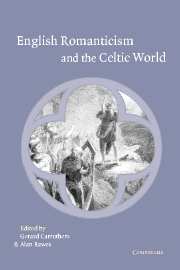Book contents
- Frontmatter
- Contents
- List of contributors
- Acknowledgements
- 1 Introduction: romancing the Celt
- 2 Sir William Jones, the Celtic Revival and the Oriental Renaissance
- 3 The critical response to Ossian's Romantic bequest
- 4 Blake and Gwendolen: territory, periphery and the proper name
- 5 The Welsh American dream: Iolo Morganwg, Robert Southey and the Madoc legend
- 6 Wordsworth, North Wales and the Celtic landscape
- 7 The force of ‘Celtic memories’ in Byron's thought
- 8 Shelley, Ireland and Romantic Orientalism
- 9 Byron and the ‘Ariosto of the North’
- 10 Scott and the British tourist
- 11 Felicia Hemans, Byronic cosmopolitanism and the ancient Welsh bards
- 12 Luttrell of Arran and the Romantic invention of Ireland
- 13 Contemporary Northern Irish poets and Romantic poetry
- Notes
- Bibliography
- Index
7 - The force of ‘Celtic memories’ in Byron's thought
Published online by Cambridge University Press: 22 September 2009
- Frontmatter
- Contents
- List of contributors
- Acknowledgements
- 1 Introduction: romancing the Celt
- 2 Sir William Jones, the Celtic Revival and the Oriental Renaissance
- 3 The critical response to Ossian's Romantic bequest
- 4 Blake and Gwendolen: territory, periphery and the proper name
- 5 The Welsh American dream: Iolo Morganwg, Robert Southey and the Madoc legend
- 6 Wordsworth, North Wales and the Celtic landscape
- 7 The force of ‘Celtic memories’ in Byron's thought
- 8 Shelley, Ireland and Romantic Orientalism
- 9 Byron and the ‘Ariosto of the North’
- 10 Scott and the British tourist
- 11 Felicia Hemans, Byronic cosmopolitanism and the ancient Welsh bards
- 12 Luttrell of Arran and the Romantic invention of Ireland
- 13 Contemporary Northern Irish poets and Romantic poetry
- Notes
- Bibliography
- Index
Summary
Byron is customarily thought of as an English poet and not infrequently claimed as a Scottish poet but, despite Matthew Arnold's insistence that the ‘Celtic passion of revolt’ is titanically embodied in Byron, he is not normally thought of as a Celtic poet. This volume prompts us to ask if there is any useful sense in which he might be thought to be one, and whether Byron himself entertained this possibility?
A passage in Byron's last major poem, The Island (1823), seems to give a wholly positive answer to our second query:
And Loch-na-gar with Ida looked o'er Troy,
Mixed Celtic memories with the Phrygian mount,
And Highland linns with Castalie's clear fount.
(II. 290–3)Byron recalls in these lines the first ten years of his life in Aberdeen where he wore the Gordon tartan of his mother's clan and felt ‘at home with the people lowland & Gael’. Especially he recalled his summer holidays, from the ages of eight to ten, at the farmhouse of Ballaterich on Deeside. Here he rambled on hill and mountains, such as Loch na Garr, swam, and heard Gaelic spoken. When he was at Cambridge, he wrote a poem, ‘The Adieu. written under the impression that the author would soon die’. This poem identified the sources of his personality and Muse as Harrow, Cambridge, the Highlands, Newstead Abbey and Southwell.
- Type
- Chapter
- Information
- English Romanticism and the Celtic World , pp. 103 - 116Publisher: Cambridge University PressPrint publication year: 2003
- 1
- Cited by



